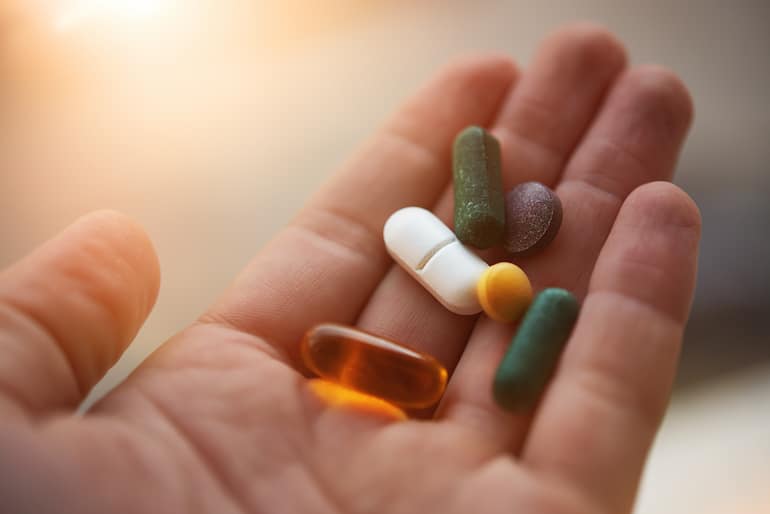Hormones are chemical messengers that have profound effects on your mental, physical, and emotional health. For instance, they play a major role in controlling your appetite, weight, and mood.
Your body typically produces the precise amount of each hormone needed for various processes to keep you healthy.
However, sedentary lifestyles and Western dietary patterns may affect your hormonal environment. In addition, levels of certain hormones decline with age, and some people experience a more dramatic decrease than others.
A nutritious diet and other healthy lifestyle habits may help improve your hormonal health and allow you to feel and perform your best.
Natural Ways to Balance Your Hormones
Eat enough protein at every meal
Consuming adequate amounts of protein is extremely important.
Not only does protein provideTrusted Source essential amino acids that your body can’t make on its own, but your body also needs it to produce protein-derived hormones — also known as peptide hormones.
Your endocrine glands make these hormones from amino acids. Peptide hormones play a crucial role in regulating many physiological processes, such as growth, energy metabolism, appetite, stress, and reproduction.
For example, protein intake influencesTrusted Source hormones that control appetite and food intake, communicating information about energy status to your brain.
Research has shown that eating protein decreasesTrusted Source the hunger hormone ghrelin and stimulatesTrusted Source the production of hormones that help you feel full, including peptide YY (PYY) and glucagon-like peptide-1 (GLP-1).
One 3-month studyTrusted Source in 156 teenagers with obesity correlated a high protein breakfast with increased PYY and GLP-1 levels, which resulted in weight loss due to increased feelings of fullness.
Experts recommend eating a minimum of 15–30 grams of protein per meal. You can do this by including high protein foods such as eggs, chicken breast, lentils, or fish at each meal.
Engage in regular exercise
Physical activity strongly influences hormonal health. Aside from improving blood flow to your muscles, exercise increases hormone receptor sensitivity, meaning that it enhances the delivery of nutrients and hormone signals.
A major benefit of exercise is its abilityTrusted Source to reduce insulin levels and increase insulin sensitivity.
Insulin is a hormone that allows cells to take up sugar from your bloodstream to use for energy. However, if you have a condition called insulin resistance, your cells may not effectively react to insulin. This condition is a risk factor for diabetes, obesity, and heart disease.
However, while some researchers still debate whether the improvements come from exercise itself or from losing weight or fat, evidence showsTrusted Source that regular exercise may improve insulin resistance independently of body weight or fat mass reduction.
Many types of physical activity have been found to help prevent insulin resistance, including high intensity interval trainingTrusted Source, strength trainingTrusted Source, and cardioTrusted Source.
Being physically active may alsoTrusted Source help boost levels of muscle-maintaining hormones that decline with age, such asTrusted Source testosterone, IGF-1, DHEA, and growth hormone (HGH).
For people who cannot perform vigorous exercise, even regular walking may increaseTrusted Source key hormone levels, potentially improving strength and quality of life.
Maintain a moderate weight
Weight gain is directly associated with hormonal imbalances that may lead to complications in insulin sensitivity and reproductive health.
Obesity is strongly relatedTrusted Source to the development of insulin resistance, while losing excess weight is linkedTrusted Source to improvementsTrusted Source in insulin resistance and reducedTrusted Source risk of diabetes and heart disease.
Obesity is also associatedTrusted Source with hypogonadism, a reduction or absence of hormone secretion from the testes or ovaries. In fact, this condition is one of the most relevantTrusted Source hormonal complications of obesity in people assigned male at birth.
This means obesity is strongly related to lower levels of the reproductive hormone testosterone in people assigned male at birth and contributesTrusted Source to a lack of ovulation in people assigned female at birth, both of which are common causes of infertility.
Nonetheless, studies indicate that weight loss may reverse this condition. Eating withinTrusted Source your own personal calorie range can helpTrusted Source you maintain hormonal balance and a moderate weight.
Take care of your gut health
Your gut contains more thanTrusted Source 100 trillion friendly bacteria, which produce numerous metabolites that may affect hormone health both positively and negatively.
Your gut microbiome regulates hormones by modulating insulin resistanceTrusted Source and feelings of fullnessTrusted Source.
For example, when your gut microbiomeTrusted Source ferments fiber, it produces short-chain fatty acids (SCFAs) such as acetate, propionate, and butyrate.
Acetate and butyrate may aidTrusted Source weight management by increasing calorie burning and thus help prevent insulin resistance.
Acetate and butyrate may alsoTrusted Source regulate feelings of fullness by increasing the fullness hormones GLP-1 and PYY.
Interestingly, studies in rodents showTrusted Source that obesity may change the composition of the gut microbiome to promote insulin resistance and inflammation.
In addition, lipopolysaccharides (LPS) — components of certain bacteria in your gut microbiome — may increase your risk of insulin resistance. People with obesity seem to haveTrusted Source higher levels of circulating LPS.
Here are some tips to maintain healthy gut bacteria which may also help you maintain a healthy hormone balance.
Lower your sugar intake
Minimizing added sugar intake may be instrumental in optimizing hormone function and avoiding obesity, diabetes, and other diseases.
The simple sugar fructose is present in many types of sugar, comprising up to 43% of honeyTrusted Source, 50% of refined table sugarTrusted Source, 55% of high fructose corn syrup, and 90% of agave.
In addition, sugar-sweetened beverages are the primary source of added sugars in the Western diet, and fructose is commonly used commercially in soft drinks, fruit juice, and sport and energy drinks.
Fructose intake has increased exponentially in the United States since around 1980, and studies consistently showTrusted Source that eating added sugar promotesTrusted Source insulin resistance — at least some of whichTrusted Source are independent of total calorie intake or weight gain .
Long-term fructose intake has been linked toTrusted Source disruptions of the gut microbiome, which may lead to other hormonal imbalances.
What’s more, fructose may fail to stimulate the production of the fullness hormone leptin, leading to decreased calorie burning and increased weight gain.
FAQs
Which vitamin is best for hormonal imbalance?

1. Vitamin D. Vitamin D controls the creation and movement of estrogen and progesterone to keep these chemicals adjusted . This nutrient additionally assists in directing insulin and blood with sugaring level .
How do you fix hormone imbalance?
Chemical or anti-conception medication.
Vaginal estrogen.
Chemical substitution prescriptions.
Eflornithine (Vaniqa).
Against androgen drugs. ...
Clomiphene (Clomid) and letrozole (Femara).
Helped regenerative innovation.
What is the best morning drink for hormonal imbalance?
Drinks that assistance with hormonal irregularity: lemon water Warm lemon water, plentiful in L-ascorbic acid, can assist you with feeling more enthusiastic. Lemons likewise direct chemicals like glucose and leptin. It is prudent to drink a glass of warm lemon water first thing.
Can drinking lots of water balance hormones?
Water is fundamental for the creation and guideline of sex chemicals, including estrogen and testosterone. Legitimate hydration is especially significant for conceptive wellbeing and generally speaking hormonal equilibrium.
What foods should you avoid for hormonal imbalance?
Food varieties to Stay away from Red meat, handled and low quality foods, dairy items, caffeine, and soy items are some food choices that can demolish the hormonal equilibrium of a body. The referenced food choices have high measures of immersed fats and components that can upset the equilibrium of chemicals.

